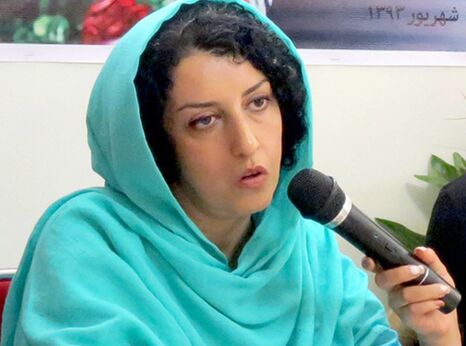Human rights defender's life at risk of Covid-19

The office of the prosecutor in Tehran has refused to process the complaint that Narges Mohammadi filed in late December 2019 in connection with her alleged abuses by the head of Evin prison. The prosecution authorities have also refused to give her a copy of a report by the Legal Medicine Organization of Iran (a forensic institute under the supervision of the judiciary), which, according to Narges Mohamadi, confirmed in late December 2019 that she sustained bruises and injuries in the course of her violent transfer from Evin prison to Zanjan’s prison. Instead, they have told her lawyer that she must apologize in writing to the head of Evin prison for publicly accusing him of torture and other ill-treatment.
Narges Mohammadi and 11 other women in Zajan prison have suffered from suspected COVID-19 symptoms since 29 June. Her family has repeatedly gone to the office of the prosecutor in Zanjan province, requesting that she is provided with medical care. On 8 July, following repeated follow-ups, she and the other 11 women were tested for COVID-19, but the authorities have refused to inform them of the test results. Around the same time, the authorities moved several women in the women’s ward who were not showing any symptoms to another location. This has heightened fears that Narges Mohammadi and the other 11 women are infected with the coronavirus. She is at particular risk of severe illness or death, due to a pre-existing lung disease, which is characterized by breathing difficulties, and for which she must use an inhaler and regularly take anticoagulant medications that prevent the formation of blood clots in her lungs. Doctors have advised that a specialist doctor must examine her regularly, and at least every six months, in order to adjust the dose of her medications. Despite this, since her transfer to Zanjan prison on 24 December 2019, she has not had access to any specialized health care. As a result, her prescriptions have not been renewed and she is not receiving essential medications. The office of the prosecutor in Zanjan province has told her family that ministry of intelligence officials in Tehran have explicitly instructed not to transfer her outside Zanjan prison. In April 2020, she suffered for several weeks from severe coughs and chest pain after the authorities applied heavy dosages of disinfestation treatments to address bedbug infestations.
The placement of Narges Mohammadi next to women convicted of serious violent crimes is in breach of both Iranian law and international law and standards, which require the authorities to keep prisoners convicted of non-violent offenses separate from prisoners convicted of violent offenses. In April 2020, a prisoner convicted of murder reportedly threatened to kill her. Assaults against inmates both by other inmates and prison staff are frequently reported, amid the authorities’ failure to address a prevalence of mental health issues among prisoners. These unsafe conditions have contributed to a deterioration in Narges Mohammadi’s mental well-being.
She and other women held in Zanjan prison also suffer from overcrowding, poor ventilation, filthy and insufficient bathroom facilities, and lack of adequate sanitary facilities and products to wash their dishes and clothes and maintain hygiene. Meals distributed to prisoners are also described as inedible, forcing Narges Mohammadi to subsist mainly on bread, yogurt, tomato, onion and beans, which she purchases from the prison shop and cooks in prison. There are concerns that she is not receiving the high-protein diet that doctors have advised for wound healing and recovery following the surgeries that she had in 2018 and 2019 to remove her uterus and gallbladder.
Narges Mohammadi has been imprisoned since her arrest in May 2015. The authorities said that she was arrested to resume serving a six-year prison sentence from 2011 which stemmed solely from her peaceful human rights activities at the Centre for Human Rights Defenders. However, she believes that her arrest was in reprisal for her 2014 meeting with Catherine Ashton, the then EU High Representative for Foreign Affairs and Security Policy. She was sentenced to an additional 16-year prison sentence in May 2016, following an unfair trial before Branch 15 of the Revolutionary Court in Tehran. Under Iran’s sentencing guidelines, she is required to serve 10 years of this sentence. Her conviction was linked solely to her human rights work, including her involvement with the Campaign for Step by Step Abolition of the Death Penalty (known by its Persian acronym Legam). Since her arrest, she has only been granted leave once for three days. Throughout her years in prison, she has been visited multiple times by a ministry of intelligence interrogator, who presides over her case, and pressured to sign an undertaking, committing not to continue her human rights work. In a letter leaked from Zanjan prison in late December 2019, Narges Mohammadi wrote: “In order to silence my voice, the Islamic Republic system has not spared me any violent action, from condemning me to lengthy imprisonment to depriving me of seeing my children or even hearing their voices on the phone to beatings, exile, insults and assaults on my dignity… What keeps me on my feet … is my love for the proud and tormented people of my country, and for the ideals of justice and freedom. Until my last breath, I will not stop speaking about justice, crying out against oppression, defending those who seek justice and freedom, and demanding the realization of sustainable peace.”